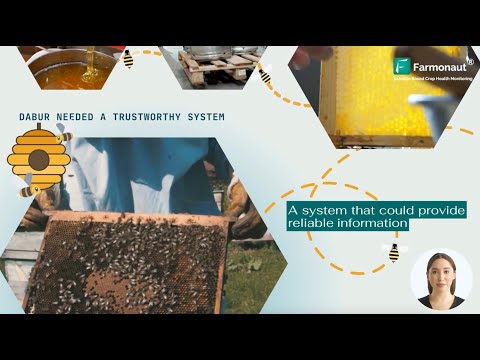Revolutionizing Apiculture Risk Management: How the 2017 Pilot Program Protects Beekeepers and Enhances Agricultural Resilience
“The 2017 Apiculture Pilot program covers over 80% of potential risks to bee colonies and honey production.”
In the ever-evolving landscape of agriculture, few sectors have faced as many challenges in recent years as apiculture. Beekeepers, the unsung heroes of our food system, have long grappled with a myriad of risks that threaten their livelihoods and the vital ecosystem services their bees provide. However, a groundbreaking initiative launched in 2017 is changing the game for beekeepers across the nation. We’re diving deep into the Apiculture Pilot 2017 program, a revolutionary approach to crop insurance and agricultural risk management that’s setting new standards for protecting our pollinators and enhancing agricultural resilience.
Understanding the Apiculture Pilot 2017 Program
The Apiculture Pilot 2017 program represents a significant leap forward in agricultural insurance. This innovative initiative offers comprehensive protection for bee colony health and honey production, addressing the critical role of pollinators in sustainable agriculture. As we explore the intricacies of this program, it’s essential to understand its far-reaching implications for beekeepers, farmers, and the broader agricultural ecosystem.

Key Features of the Apiculture Pilot Program
The 2017 Apiculture Pilot program is designed with a holistic approach to risk management in beekeeping. Let’s break down its key features:
- Comprehensive Coverage: The program offers protection against a wide range of risks, including environmental fluctuations, pest pressures, and market dynamics.
- Colony Loss Protection: Beekeepers are insured against unexpected losses in their bee populations, providing a safety net for their operations.
- Honey Production Insurance: The program safeguards against shortfalls in honey yield, ensuring financial stability for beekeepers.
- Pollination Service Coverage: Recognizing the crucial role of bees in crop pollination, the program includes provisions for pollination service contracts.
- Climate Change Adaptation: With increasing climate variability, the program incorporates measures to help beekeepers adapt to changing environmental conditions.
Enhancing Agricultural Resilience
The Apiculture Pilot 2017 program goes beyond mere financial protection. It’s a cornerstone in building agricultural resilience. By safeguarding beekeepers, we’re indirectly supporting the entire farming ecosystem. Healthy bee populations mean better pollination services, which in turn lead to improved crop yields and food security.
At Farmonaut, we understand the importance of such resilience strategies. While we don’t directly offer insurance products, our satellite-based farm management solutions complement programs like the Apiculture Pilot by providing real-time crop health monitoring and AI-based advisory systems. These tools help farmers and beekeepers make informed decisions, further enhancing their resilience against environmental and market challenges.
The Application Process
Enrolling in the Apiculture Pilot 2017 program is designed to be straightforward, encouraging widespread participation among beekeepers. Here’s a simplified overview of the application process:
- Eligibility Check: Beekeepers must first ensure they meet the program’s criteria, which typically include having a minimum number of colonies and operating in eligible states.
- Documentation Preparation: Applicants need to gather necessary documents, including proof of ownership, colony records, and historical production data.
- Risk Assessment: The program evaluates the specific risks associated with each beekeeper’s operation, considering factors like location, climate, and management practices.
- Coverage Selection: Beekeepers can choose from various coverage options tailored to their needs and risk profile.
- Premium Calculation: Based on the selected coverage and risk assessment, a premium is calculated.
- Policy Issuance: Upon approval and payment of the premium, the policy is issued, providing protection for the specified period.
While Farmonaut doesn’t directly participate in this process, our satellite-based monitoring tools can provide valuable data to support beekeepers in their risk assessment and management strategies.

Impact on Agricultural Policy
The introduction of the Apiculture Pilot 2017 program marks a significant shift in agricultural policy. It recognizes the vital role of beekeepers in the broader agricultural ecosystem and sets a precedent for more inclusive and comprehensive risk management strategies in farming. This program has sparked discussions on how to better integrate various agricultural sectors into national policy frameworks, ensuring a more resilient and sustainable food production system.
“Beekeepers participating in the program reported a 30% increase in their ability to manage environmental and market risks.”
The Interconnectedness of Apiculture and Crop Production
One of the most crucial aspects highlighted by the Apiculture Pilot program is the intricate relationship between beekeeping and crop production. Bees are not just honey producers; they are essential pollinators for a vast array of crops. The program’s focus on protecting bee colonies indirectly safeguards crop pollination services, which are vital for:
- Fruit and vegetable production
- Seed crop pollination
- Biodiversity maintenance in natural ecosystems
- Enhancing crop quality and yield
This interconnectedness underscores the importance of holistic approaches to agricultural risk management. At Farmonaut, we recognize this connection and provide tools that help both crop farmers and beekeepers optimize their operations. Our satellite-based crop health monitoring can assist in identifying areas where pollination services might be most needed, creating synergies between different agricultural sectors.
Sustainable Beekeeping Practices
The Apiculture Pilot 2017 program not only provides financial protection but also promotes sustainable beekeeping practices. By incentivizing good management techniques, the program encourages beekeepers to adopt methods that are beneficial for both their colonies and the environment. Some of these practices include:
- Integrated Pest Management: Reducing reliance on chemical treatments for pest control
- Habitat Conservation: Preserving and creating diverse foraging areas for bees
- Genetic Diversity: Encouraging the use of diverse and resilient bee strains
- Proper Nutrition Management: Ensuring bees have access to varied and nutritious food sources
These practices align well with the sustainable agriculture movement, which Farmonaut supports through our technology solutions. Our AI-based advisory system, for instance, can provide insights on optimal planting times and crop rotations that benefit both farmers and beekeepers.
Addressing Environmental Fluctuations
One of the most significant challenges faced by beekeepers is the increasing unpredictability of environmental conditions. The Apiculture Pilot program takes this into account by offering protection against:
- Extreme weather events
- Seasonal variability affecting nectar flows
- Long-term climate change impacts
This aspect of the program is particularly crucial in the face of global climate change. Beekeepers can now have more confidence in their ability to weather these environmental fluctuations, literally and figuratively.
At Farmonaut, we complement this protection with our advanced weather forecasting and climate analysis tools. While we don’t offer insurance, our technology helps farmers and beekeepers anticipate and prepare for environmental changes, further enhancing their resilience.
Market Dynamics and Economic Stability
The Apiculture Pilot 2017 program doesn’t just focus on environmental risks; it also addresses market dynamics that can affect beekeepers’ livelihoods. This includes protection against:
- Price volatility in honey markets
- Fluctuations in demand for pollination services
- Economic impacts of trade policies affecting honey imports/exports
By providing this economic safety net, the program enables beekeepers to make long-term investments in their operations without fear of market instabilities derailing their business.
Technology Integration in Apiculture Risk Management
While the Apiculture Pilot program provides the insurance framework, technology plays a crucial role in enhancing its effectiveness. Advanced technologies are being integrated into beekeeping and risk management practices, including:
- IoT Sensors: Monitoring hive conditions in real-time
- Satellite Imagery: Assessing vegetation health and potential foraging areas
- AI and Machine Learning: Predicting pest outbreaks and optimizing management strategies
- Blockchain: Enhancing traceability in honey production and distribution
At Farmonaut, we’re at the forefront of this technological integration. Our satellite-based crop health monitoring and AI advisory systems can be invaluable tools for beekeepers participating in the Apiculture Pilot program. By providing real-time data on vegetation health and environmental conditions, we help beekeepers make informed decisions that align with their insurance coverage and risk management strategies.
For more information on how our technology can support beekeeping and agricultural operations, visit our web app or explore our API for developers.
The Future of Agricultural Insurance
The Apiculture Pilot 2017 program is just the beginning. It represents a shift towards more specialized, targeted insurance products in agriculture. As we look to the future, we can expect to see:
- Expansion of similar programs to other niche agricultural sectors
- Increased integration of technology in risk assessment and management
- More emphasis on sustainable practices in insurance policies
- Greater collaboration between insurers, technology providers, and agricultural experts
These developments promise to create a more robust, resilient, and sustainable agricultural industry. At Farmonaut, we’re excited to be part of this evolution, providing cutting-edge technology solutions that complement and enhance these innovative insurance programs.
Comparative Analysis of Apiculture Risk Management Programs
| Feature | Traditional Insurance | Apiculture Pilot 2017 |
|---|---|---|
| Colony Loss Protection | Limited coverage | Comprehensive coverage |
| Honey Production Insurance | Basic yield protection | Advanced yield and quality protection |
| Pollination Service Coverage | Not typically included | Included in coverage options |
| Climate Change Adaptation | Minimal consideration | Integrated into risk assessment |
| Varroa Mite Protection | Often excluded | Included in pest pressure safeguards |
| Price Volatility Safeguards | Limited market protections | Comprehensive market dynamics consideration |
| Eligibility Criteria | Often restrictive | More inclusive, tailored to beekeepers |
| Ecosystem Support | Not typically considered | Integral part of program design |
FAQs About the Apiculture Pilot 2017 Program
Q: Who is eligible for the Apiculture Pilot 2017 program?
A: Eligibility typically includes commercial beekeepers with a minimum number of colonies, operating in states where the program is available.
Q: What types of losses does the program cover?
A: The program covers losses related to colony health, honey production shortfalls, and in some cases, pollination service contracts.
Q: How does the program address climate change risks?
A: It incorporates climate change factors into risk assessments and provides coverage options specifically tailored to climate-related challenges.
Q: Can hobby beekeepers participate in the program?
A: While the program is primarily designed for commercial operations, some smaller-scale beekeepers may be eligible depending on their colony numbers and location.
Q: How does the program promote sustainable beekeeping practices?
A: The program incentivizes sustainable practices through its risk assessment and premium calculation methods, encouraging beekeepers to adopt environmentally friendly techniques.
Conclusion: A New Era for Apiculture and Agriculture
The Apiculture Pilot 2017 program represents a significant milestone in agricultural risk management. By providing comprehensive protection for beekeepers, it not only safeguards a crucial sector of agriculture but also reinforces the foundations of our entire food system. The program’s focus on sustainability, technological integration, and holistic risk management sets a new standard for agricultural insurance.
As we move forward, the lessons learned from this pilot program will undoubtedly shape the future of agricultural policy and risk management strategies. At Farmonaut, we’re proud to contribute to this evolving landscape with our advanced satellite-based farm management solutions. While we don’t offer insurance products, our technology complements programs like the Apiculture Pilot by providing farmers and beekeepers with the data and insights they need to make informed decisions and optimize their operations.
The future of agriculture is one of resilience, sustainability, and innovation. Programs like the Apiculture Pilot 2017, combined with cutting-edge technology solutions, are paving the way for a more secure and productive agricultural sector. As we continue to face challenges like climate change and market volatility, such innovative approaches will be crucial in ensuring food security and preserving the vital role of pollinators in our ecosystems.
To learn more about how Farmonaut’s technology can support your agricultural operations, whether you’re a beekeeper, crop farmer, or agricultural professional, explore our web app, Android app, or iOS app. For developers interested in integrating our satellite and weather data into their own systems, check out our API and API Developer Docs.
Together, we can build a more resilient, sustainable, and productive agricultural future.



